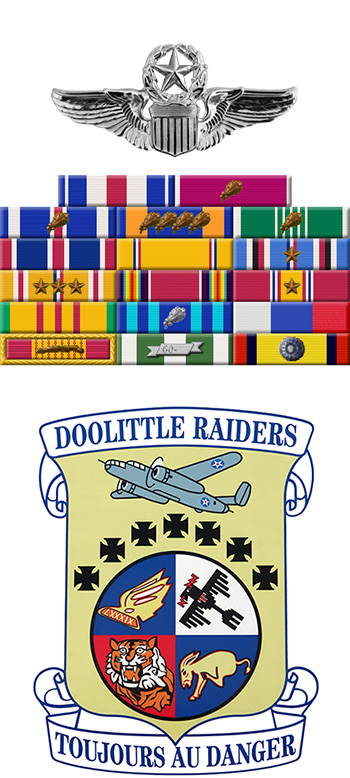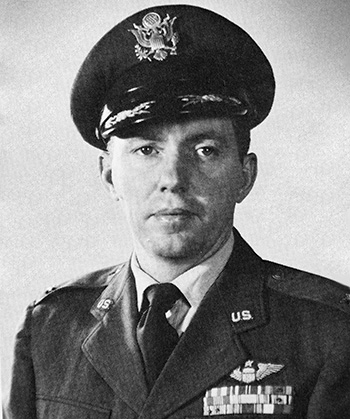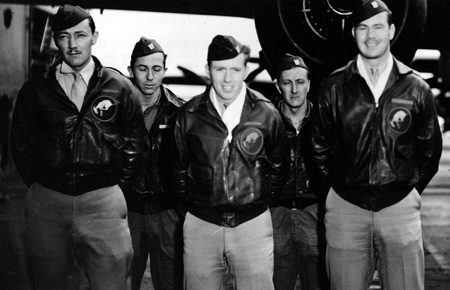
|
Everett W. Holstrom |
 |
|||
| Rank, Service | ||||
Brigadier General O-7, U.S. Air Force |
||||
| Veteran of: | ||||
|
||||
| Tribute: | ||||
Everett Holstrom was born on May 4, 1916, in Cottage Grove, Oregon. He enlisted in the Oregon Army National Guard on August 7, 1934, and was trained as a radio operator, serving until he enlisted in the Aviation Cadet Program of the U.S. Army Air Corps on December 26, 1939. He was commissioned a 2d Lt and awarded his pilot wings at Kelly Field, Texas, on August 30, 1940, followed by service as a B-23 Dragon and then B-25 Mitchell pilot with the 95th Bomb Squadron of the 17th Bomb Group at McChord Field, Washington, and then at Pendleton Field, Oregon, from September 1940 until he was selected for the Doolittle Mission in February 1942. During this time he became the first pilot to destroy an enemy submarine off the West Coast of the United States on December 25, 1941. Lt Holstrom was the pilot on the fourth B-25 to take off from the aircraft carrier USS Hornet (CV-8) on April 18, 1942, and after bombing Tokyo his crew flew to China and bailed out when their aircraft ran out of fuel. He remained in the China-Burma-India Theater after the raid, serving as a B-25 pilot with the 11th Bomb Squadron of the 341st Bomb Group in India from April 1942 to January 1943, and then as Commander of the 11th Bomb Squadron from January to May 1943. After returning to the United States in June 1943, Lt Col Holstrom served in various Stateside assignments until deploying to Alaska from October 1946 to April 1947. His next assignment was as A-3 Officer for the 28th Bomb Wing at Rapid City AFB, South Dakota, from April 1947 to May 1948, followed by service as Chief of the Combat Operations Branch with Headquarters Strategic Air Command at Andrews AFB, Maryland, and then at Offutt AFB, Nebraska, from May 1948 to May 1950. Col Holstrom served as Deputy Chief of the Tactical Operations Division with Headquarters Strategic Air Command at Offutt from May to September 1950, and then as Director of Operations and Training with the 91st Strategic Reconnaissance Group at Barksdale AFB, Louisiana, from September 1950 to January 1951. He served a short time as Commander of the 3234th Strategic Reconnaissance Squadron at Barksdale AFB from January to February 1951, and then as Director of Operations for the 91st Strategic Reconnaissance Wing at Barksdale from February to June 1951. Col Holstrom next served as Deputy Commander of the 91st Strategic Reconnaissance Wing at Barksdale and then at Lockbourne AFB, Ohio, from June 1951 to August 1953, followed by service as Director of Operations with Headquarters 2nd Air Force at Barksdale AFB from August 1953 to June 1955. His next assignment was as Commander of the 301st Bomb Wing at Barksdale AFB from June 1955 to April 1957, and then as Deputy Commander of the 4th Air Division at Barksdale from April to June 1957. He served as Chief of the Operations Plans Division with Headquarters Strategic Air Command at Offutt AFB from June 1957 to September 1959, and then as Commander of the 4130th Strategic Wing at Bergstrom AFB, Texas, from September 1959 to June 1961. His next assignment was as Commander of the 43rd Bomb Wing at Carswell AFB, Texas, from June 1961 to August 1964, followed by service as Commander of the 816th Strategic Air Division at Altus AFB, Oklahoma, from August 1964 to July 1965. Brig Gen Holstrom served as Commander of the 12th Strategic Aerospace Division at Davis-Monthan AFB, Arizona, from July 1965 to September 1966, and then as the United States Deputy Chief of Staff for the secret planning group LIVE OAK with NATO at Mons, Belgium, from September 1966 until his retirement from the Air Force on July 1, 1969. Everett Holstrom died on December 2, 2000, and was buried at Arlington National Cemetery. |
||||
|
||||


